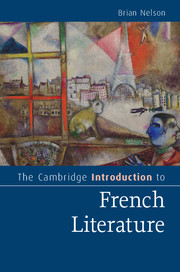Book contents
- Frontmatter
- Dedication
- Contents
- Preface
- Acknowledgements
- Chronology
- 1 Villon: a dying man
- 2 Rabelais: the uses of laughter
- 3 Montaigne: self-portrait
- 4 Corneille: heroes and kings
- 5 Racine: in the labyrinth
- 6 Molière: new forms of comedy
- 7 La Fontaine: the power of fables/fables of power
- 8 Madame de Lafayette: the birth of the modern novel
- 9 Voltaire: the case for tolerance
- 10 Rousseau: man of feeling
- 11 Diderot: the enlightened sceptic
- 12 Laclos: dangerous liaisons
- 13 Stendhal: the pursuit of happiness
- 14 Balzac: ‘All is true’
- 15 Hugo: the divine stenographer
- 16 Baudelaire: the streets of Paris
- 17 Flaubert: the narrator vanishes
- 18 Zola: the poetry of the real
- 19 Huysmans: against nature
- 20 Mallarmé: the magic of words
- 21 Rimbaud: somebody else
- 22 Proust: the self, time and art
- 23 Jarry: the art of provocation
- 24 Apollinaire: impresario of the new
- 25 Breton … Company: Surrealism
- 26 Céline: night journey
- 27 Sartre: writing in the world
- 28 Camus: a moral voice
- 29 Beckett: filling the silence
- 30 French literature into the twenty-first century
- Notes
- Further reading
- Index of authors and titles
- Index of genres, movements and concepts
- Cambridge Introductions to …
- References
11 - Diderot: the enlightened sceptic
Published online by Cambridge University Press: 05 July 2015
- Frontmatter
- Dedication
- Contents
- Preface
- Acknowledgements
- Chronology
- 1 Villon: a dying man
- 2 Rabelais: the uses of laughter
- 3 Montaigne: self-portrait
- 4 Corneille: heroes and kings
- 5 Racine: in the labyrinth
- 6 Molière: new forms of comedy
- 7 La Fontaine: the power of fables/fables of power
- 8 Madame de Lafayette: the birth of the modern novel
- 9 Voltaire: the case for tolerance
- 10 Rousseau: man of feeling
- 11 Diderot: the enlightened sceptic
- 12 Laclos: dangerous liaisons
- 13 Stendhal: the pursuit of happiness
- 14 Balzac: ‘All is true’
- 15 Hugo: the divine stenographer
- 16 Baudelaire: the streets of Paris
- 17 Flaubert: the narrator vanishes
- 18 Zola: the poetry of the real
- 19 Huysmans: against nature
- 20 Mallarmé: the magic of words
- 21 Rimbaud: somebody else
- 22 Proust: the self, time and art
- 23 Jarry: the art of provocation
- 24 Apollinaire: impresario of the new
- 25 Breton … Company: Surrealism
- 26 Céline: night journey
- 27 Sartre: writing in the world
- 28 Camus: a moral voice
- 29 Beckett: filling the silence
- 30 French literature into the twenty-first century
- Notes
- Further reading
- Index of authors and titles
- Index of genres, movements and concepts
- Cambridge Introductions to …
- References
Summary
Does anyone really know where they're going?
– Diderot, Jacques the FatalistDenis Diderot (1713–84) was a supreme man of letters as understood in the eighteenth century: that is to say, a person seriously concerned with every aspect of human activity and critical inquiry. The range of his writings was astonishing. Moreover, he made important and original contributions in almost every field he engaged with: the natural sciences, moral philosophy, art criticism, the nature of theatre and of acting, the art of fiction. Towards the end of his life, he even travelled to St Petersburg to meet Catherine the Great and advise her on the government of Russia. If his work has a unifying theme, it lies in his exploration of the implications – ethical, political and aesthetic – of a materialist world-view. But rather than proposing firm answers, Diderot asks questions; what is most characteristic of him is his philosophical scepticism and its expression in peculiarly dialogic forms. His intellectual interests and his mode of writing make him the most modern of the great figures of the Enlightenment.
The mind of a sceptic
Diderot was best known by his contemporaries as the editor of the famous Encyclopédie, a vast work published between 1751 and 1772 and comprising seventeen folio volumes of text and eleven volumes of plates. The aim of the Encyclopédie was to collate all the knowledge of the day – scientific, philosophical, historical and practical – and to disseminate that knowledge with a view to reducing theological superstition and improving the human lot. It was a monument to Enlightenment values and its project of demystification. Diderot challenged conventional thinking of any kind and encouraged his readers to beware of preconceived ideas. However, he was interested less in the accumulation of knowledge than in its instability and limits. He had a sense of existence as dynamic and constantly changing.
- Type
- Chapter
- Information
- The Cambridge Introduction to French Literature , pp. 74 - 81Publisher: Cambridge University PressPrint publication year: 2015

